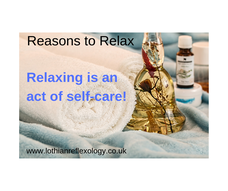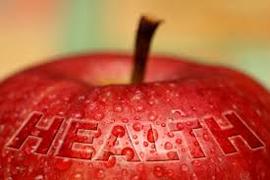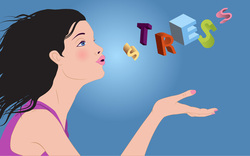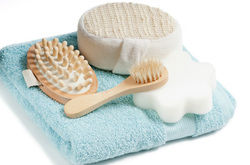 A chronic neck and shoulder problem has forced me to slow down and fundamentally re-think my lifestyle. And my first thought was, "Why had it taken a physical condition to force me to slow down and start paying attention to myself?". And then I remembered, I haven't been doing my Reflexology swops as regularly as I used to. It's often the case that the body sends little signals of discomfort and distress and we're so busy that we just ignore it, maybe put it to one side thinking we'll deal with it later. But life happens! I don't know about you, but my experience of life is that it rarely gets calmer or quieter for long - maybe a pause for the odd holiday and then it's back to the rush that is life. It's so easy to find new things to be busy with - whether it's work pressures or home or family, there always seems to be something that squeezes out the time that we have available for ourselves. And when we get into that cycle of always having something to do, our bodies might start to speak a little louder with stronger signals of discomfort and distress. Until it brings us to crisis point - just because we've ignored the softer signals. Since my "crisis" (thankfully uncomfortable but fixable) I've had to recognise how little time I spend just being ME. Time when I do nothing and allow my mind to listen and more importantly hear what my body is saying. I used to be quite good at that, but it has slipped over the past few years. Just because I don't get very stressed about things, I've assumed that I'm relaxed and tuned into myself, but patently that isn't true. It's time to relax. And as I've spend more time dedicated to relaxation I've begun to notice the more nuanced signals from my body about hungry, thirsty for water (rather than the copious amounts of tea that I normally consume), getting tired and the feelings that normally get pushed down and ignored (nervous, fearful, disappointed, etc). And I've also noticed that I opt for self-care more than I used to - a cancellation now becomes an opportunity for a foot treatment or a walk. Relaxation allows us to tune into ourselves: it allows our mind and body to communicate effectively and develop an equal relationship, instead of the mind being do dominant and ignoring what the body's saying. It allows us to notice when and what self-care is required and also to build resiliance so that we can set and maintain our boundaries - the ability to say "no" or "not now" can really help to save energy, reduce stress and help us to feel good about ourselves. So now, as well as taking time out to relax - and by that I mean taking time out to sit and be still - I'm getting more Reflexology swaps booked in, because Reflexology helps me to relax and tune into my body and the improved sleep and energy boost are always welcome too! If you'd like help to relax and want someone else to do the work, try a Reflexology and Indian Head Massage treatment, You can book online here: BOOK A TREATMENT .
0 Comments
 I've decided to take my own advice this month and banish winter tiredness by doing less - such as writing an original blog. After all, why reinvent the wheel! So, here's some great advice from the NHS on how to stay healthy this winter ..... "It may be cold outside, but winter needn't be the unhealthiest time of year for you and your family. Here are five ways to make sure that, even when your body is telling you to hibernate, you can keep healthy and fit, no matter what the weather's like. Banish winter tiredness Many people feel tired and sluggish during winter. This is due to the lack of sunlight, which disrupts our sleep and waking cycles. Try these tips:
Eat more fruit and veg When it's cold and dark outside, it can be tempting to fill up on unhealthy comfort food. However, it's important to ensure you still have a healthy diet and include five portions of fruit and veg a day. If you find yourself craving a sugary treat, try a juicy clementine or satsuma instead. Winter vegetables such as carrots, parsnips, swede and turnips can be roasted, mashed or made into soup for a comforting winter meal for the whole family. Explore varieties of fruit and veg that you may not normally eat. Read more about how to get your 5 A Day. Find recipes for 10 warming hot meals. Drink more milk You are more likely to get a cold in winter, so make sure your immune system is in tip-top condition. Milk and dairy products such as cheese, yoghurt and fromage frais are great sources of:
Read more about milk and dairy foods. Read more about healthy eating. Try new activities for the whole family Don't use the cold winter months as an excuse to stay in and lounge around. Instead, get out with the whole family to try out a new activity –maybe ice skating, or taking a bracing winter walk on the beach or through the park. Regular exercise helps control your weight, boost your immune system, and is a good way to break the tension that can build if the family is constantly cooped up inside the house. Read more about different types of exercise for you and your family. Have a hearty breakfast Winter is the perfect season for porridge. Eating a warm bowlful on a cold morning isn't just a delicious way to start your day, it also helps boost your intake of starchy foods and fibre. These foods give you energy and help you feel fuller for longer, stopping the temptation to snack mid-morning. Oats also contain lots of vital vitamins and minerals. Make your porridge with semi-skimmed, 1% or skimmed milk, or water, and don't add sugar or salt. Add a sliced banana, berries or other fruit for extra flavour and to help you hit your 5 A Day target. Get more ideas for healthy breakfasts." And here's the link to the page with the original article: https://www.nhs.uk/Livewell/winterhealth/Pages/Healthywinter.aspx And of course, some Reflexology won't hurt either. To book a treatment go to http://www.lothianreflexology.co.uk/book-a-treatment.html  The International Stress Management Association launched their 2008 National Stress Awareness Day with their top ten stress busters:
Pick one items from the list and put it into practice and see how well it works for you. Or you could come for a relaxing Reflexology or Indian Head Massage and let someone else take the strain for a change. Just call Doris on 07724 197627 to book your appointment. And remember there's a special JULY OFFER: £10 off your first treatment - but only if you book in July (appointments can be scheduled for August).  Hypnotherapy, affirmations, the law of attraction, NLP, positive thinking, the Silva Method - there's a long list of modalities and techniques that claim to be able to help you think positively and be able to manifest whatever you want, just by using the power of your brain. So you want to be wealthy, healthy or happy - just think yourself so. It may not be quite as simple as that, but it's most people would recognise that a strong focus and a positive attitude will be more likely to get you towards your goal more quickly. And it's not just goals that can be influenced. It's claimed that mental images produce changes in the body on a physical, chemical and immunological level that can affect health. What you see in your mind’s eye can change specific immune system responses that may affect such things as white blood cell count. It may sound a bit far fetched, but there is beginning to be some research to suggest that this might be so. Visualisation is taught to people undergoing cancer treatments or suffering from anxiety or depression. Guided imagery – more often known as visualisation – is an important tool in influencing a variety of health problems. It provides benefits and poses virtually no risk. The principle is that vivid imagery sends messages from the cerebral cortex to the lower brain. From there the message is relayed to the endocrine and the autonomic nervous systems, which affect a wide range of bodily functions, including heart and respiration rates and blood pressure. And visualisation can also be used to improve personal performance: it’s a way of programming your brain (and body) to help achieve the required outcome. Athletes place as much importance on mental preparation before an event as they do on physical preparation. It's a really simple process and since you can't stop thinking, you may as well direct your thoughts to a more specific outcome. Why not give it a try yourself.....
And talking about focus, I'd just like to remind you that I have a special JULY OFFER: £10 off your first treatment of Reflexology or Indian Head Massage, so please help me spread the word. This offer is only available for treatments booked in July, so don't delay. To book just call Doris on 07724 197627.  I discovered this article entitled "Is Reflexology The New Cure For Infertility" when I was looking for inspiration for this week's blog. It's by ANDREA PERRY, @ femail.co.uk. I'm not being lazy, honestly, I've copied and pasted the article, because for me, it's very topical. In another two weeks I'll be attending Part I of a ReproReflexology training course, which will give me a much more in-depth insight into Reflexology for fertility, building on the skill base that my previous 3 Fertility Reflexology courses have provided. I'm really looking forward to the course I'm hoping it will live up to my high expectations. I'll be looking for lots of practice after the course, so if you know anyone who might want to try Reflexology for fertility issues, please spread the word. And they don't need to take my word for it, this article gives a pretty good overview. It reads: "Infertility can be an emotionally exhausting, not to mention expensive, condition. But according to a growing number of people, the key to overcoming the problem for many couples could be far simpler than they think - thanks to reflexology. An increasing number of women claim this popular type of foot massage has helped them conceive. Now a medical study has been launched to discover if the claims are true. Reflexology, a traditional healing art dating from the ancient Egyptians and Chinese, involves manipulation of pressure points in the hands and feet and is often used to ease period pain, headaches, sinus and back problems as well as the effects of chemotherapy. Practitioners claim the soles of the feet are like a mini map of the inside of the body and are linked to our inner organs and systems, including the fallopian tubes and ovaries. By massaging different points on the feet therapists claim they can unblock energy pathways in the body and so help the body to regain its natural balance and heal itself. Some points on the foot are associated with a woman's egg production and by manipulating these areas reflexologists claim they can correct the imbalances which can hamper pregnancy. The latest research, a two year clinical trial at the IVF unit at Derriford Hospital in Plymouth, is the brainchild of reflexologist Jane Holt. She approached the unit after 13 of the 23 women she treated with a range of fertility problems fell pregnant last year. Beccy Wellington, 34, an auxiliary nurse, from Kingsbridge, in Devon, is convinced that her trip to see Jane in November 1999 resulted in the birth of her son Luke, who is now five months old. 'We had been trying for a baby for just over a year and had begun to look at other ways that would help me conceive when someone recommended reflexology,' she said. 'I had four treatments and was pregnant within three weeks. I am convinced that the reflexology got my body in working order so I was ready to conceive. I also felt ten times better, more positive and a lot happier in myself.' 'I went in there with an open mind, but was totally shocked to find myself pregnant so soon,' she said. 'I would definitely advise other women to try reflexology. It may not work for everyone, but it worked for me and it is worth trying.' Jane Holt, a reflexologist for 12 years, claims one woman she helped had been trying to get pregnant for 20 years. 'Infertility is a complex problem and I think that often what is needed is something that gives the system a bit of a kick start and that's what reflexology can do,' she said. 'At least this gives women the option to try something else while they are going through hospital procedures and even if it works for some of them that's a bonus.' Cathy Shipton, who plays nurse Duffy in the BBC TV series Casualty, is also convinced that reflexology on the set of the show in Bristol helped her to become pregnant. She had been trying to have a baby for four years, but four months after having twice weekly reflexology sessions she became pregnant. In the new study, 150 volunteers will be offered reflexology rather than the fertility drug clomifene, which is usually used to induce ovulation. This drug works in about 70 per cent of patients, but the drug's main drawback is it can increase the likelihood of a multiple pregnancy. The volunteers will each receive eight treatments over a two to three month period. In order for the trial to be conducted in a scientific way, patients and hospital staff will not know whether true reflexology or a 'dummy' version has been given. Only the reflexologist will know who has had the real treatment. One in seven couples suffers with infertility. Last year the Plymouth IVF unit saw over 900 patients. Thirty per cent of these were not producing eggs. The hospital has already pioneered the use of acupuncture - the insertion of fine needles into the body to unblock energy channels - in pregnancy and routinely offers it to women who might benefit. Dr Jonathan Lord, clinical lecturer in reproductive medicine at the hospital, is co-ordinating the new trial. 'At the moment there is no evidence to say whether reflexology works or not,' he said. 'Although there are several reports of patients in whom it has worked, this is not sufficient evidence to enable it to be routinely recommended.'" http://www.dailymail.co.uk/health/article-20980/Is-reflexology-new-cure-infertility.html And talking about the benefits of Reflexology, I'd just like to remind you that I have a special JULY OFFER: £10 off your first treatment of Reflexology or Indian Head Massage, so please help me spread the word. This offer is only available for treatments booked in July, so don't delay. To book just call Doris on 07724 197627. If you've never tried Reflexology and don't know what it is, here's a brief rundown:
What is Reflexology?
How does Reflexology work? Reflexology uses finger pressure on the feet to relax and re-balance the whole person in mind, body and emotion. It works on the principle that various parts of the feet relate to corresponding parts of the body and that by working on the feet the Reflexologist can create a balancing effect. The finger pressure on the feet is firm, so it should not feel tickly. Who can benefit from Reflexology? Anyone can benefit from Reflexology: from newborn babies to those receiving end of life care, and anyone in between, but it is particularly beneficial for anyone who is experiencing ill-health and in particular those suffering from stress or stress related illnesses. There may however be times when it is not appropriate to provide a treatment, so if you're not sure, do ask. Reflexologists often specialise in particular areas, such as: fertility, pregnancy, babies, children, ageing well, pain relief, sleep, stress, cancer care, and end of life care. What happens in a Reflexology treatment? The Reflexologist will take a few moments to gather information about the client's condition (it tends to take a bit longer for the first treatment), and then the client is made comfortable, lying on a special chair or massage table. It's possible to chat during the treatment, but it's more relaxing to just close your eyes and enjoy the experience. It's not uncommon for clients to drift off into a light doze. How will I feel after a treatment? Well, everyone is different, but generally clients will feel deeply relaxed after a treatment. Clients often report having had a good night's sleep and a boost in their energy levels after a treatment. Really the only way to know is to give the treatment a try. There have been some positive research projects carried out with reflexology; however, as yet, there is not a large enough body of evidence to make clinical claims of effectiveness. With ever increasing levels of stress in everyday life, it is important for people to take more responsibility for their own healthcare needs. Reflexology may be one of the ways to mitigate the stresses of modern life. Reflexology should not be used as an alternative to seeking medical advice. The only way to know if Reflexology will be beneficial for you is to give it a try. If you're ever feeling stressed or a bit out of sorts, think about having a Reflexology treatment to get you onto more of an even keel. To make the decision easier, I offer £5 off your first treatment. This applies to everyone, so you don't need a special voucher or ticket, it is just automatically applied when you pay for your treatment. For July, I'm offering an extra £5 off to all new clients. That means you get £10 off your first treatment if you book in July. But this offer only applies to July 2014, so don't delay, book your treatment today by calling Doris on 07724 197627, or email [email protected].  You shower or bathe every morning, right? So why not incorporate a dry body brushing routine before you step into the shower or bath – I guarantee, it will set you up for the rest of the day. Body brushing uses a loofah or natural bristle brush with a long handle (or you can use synthetic gloves, but it doesn’t feel as nice). To get the desired effect, the brush should always be kept dry. Not only will body brushing leave you feel refreshed and energised after your shower or bath, but it will help your body detoxify, exfoliate dead skin cells, improve circulation and lymphatic drainage and reduce the appearance of cellulite. The skin is the largest organ in the body and plays an important role in the elimination of toxins. and of course, smooth skin is particularly nice to have at this time of year when (hopefully) summer is just around the corner. So, how does one body brush? Well it's important to work on dry skin to get the desired effect and it's essential to work towards the heart because that stimulates the flow of lymphatic fluid. It also helps if you can remember to keep your touch light and your strokes sweeping. By the end of your body brushing routine, your skin should feel tingly, rather than sore or scratched. Begin with the feet and ankles and then move to lower legs, thighs, stomach, back and arms. Your back is the exception to the brushing upwards rule - for your back you are best to brush from the neck down. And remember it's called body brushing - so stay away from the delicate skin of the face. Once you're feeling full of zing from your brushing, you can jump into your shower or bath and wash away the dead skin cells. And afterwards, if you've got time, moisturise for that nourished, smooth, supple skin feeling. A couple of notes of caution: be careful of delicate skin areas and don't dry body brush over inflamed, cut or broken skin, or over varicose veins. Also, have your own personal body brush and wash it regularly. Give body brushing a try daily for 30 days and see the health and beauty benefits - better circulation and smoother skin. Of course, if you run out of stamina, jump into the shower before you remember to do your body brushing, or just want someone else to take the strain, a reflexology treatment could be a good substitute. It's relaxing, reviving and helps re-balance the body. And there's 20% off your first treatment in May and June 2014.  It can sometimes feel that staying healthy and ageing well can be an uphill struggle. There seem to be so many conflicting ideas about what we should and shouldn't eat, which is the best diet to follow, how much or little exercise we should get and what type of exercise is best. There's plenty of advice on what supplements and special healthy products we should be including in our diet and which health and fitness guru to follow - because different ones seem to pop up all the time, with new ideas and products. Of course, much of this is designed to relieve us of our hard earned cash, so what is the best way to stay healthy or even improve your health? I've developed a list of easy actions to take which cumulatively with benefit your health and well-being. Most cost nothing and there's a fairly heavy emphasis on reducing stress ... Belly breathing - Take a long slow breath in through your nose. Push the air down into your tummy, almost down to your waist. Let it out again slowly. This deep breathing oxygenates your blood, feeding the body cells; it reduces muscle tension and blood pressure; it clears out stale air from the lungs and opens the airways. If you are under severe pressure, you can't do anything more effective to calm yourself down than taking a series of long slow breaths. Exercise - Stress produces chemicals which, if they are not naturally neutralized are stored in the body to create a toxic effect. Exercise is a great way to release these chemicals. The key thing is not to overdo it. Work at 70% of your capacity in order that you don't tire yourself out. Give yourself a day off to rest your body. Do something you enjoy, it doesn't have to be difficult: a brisk walk in the country surrounded by the sights and sounds of nature will both tone the body and calm the mind. Take more water - Often our fluid intake can affect our energy levels. Water helps rehydrate the body and it feeds the brain (water helps to conduct all those electrical connections). If you are dehydrated your system functions less efficiently. Water helps the kidneys to function more efficiently and that helps with the removal of waste within the body. Touch therapies - You don't have to do it all yourself: give yourself a break and let someone else take the strain. Try Reflexology, Indian Head Massage, or any other touch therapy that takes your fancy. It's amazing how relaxing and re-balancing it can be. Eat well- Our bodies are very intelligent and if you listen, your body will tell you what it needs. Basically if you aim to reduce: sugar, salt, fat, additives, caffeine and alcohol; eat a wide variety of foods, eat lots of fruit and veg and some fibre, you'll probably be eating well. You can help digestion and absorption of food if you eat slowly, savouring your food as you eat and eating regular meals will help keep blood sugar levels balanced. A few small moves towards less processed food and you will find that your food gives you energy rather than robbing you of energy. Relax - Relaxation is nature's antidote to stress. Fifteen minutes every day should be enough to keep you in balance. Relaxation is about being rather than doing and we all need time just to be - ourselves. Relaxation allows the mind and body a bit of quiet time to connect with each other. Posture - Good posture supports good breathing and reduces muscle tension. For a good seated posture: have your feet flat on the floot (legs and ankles uncrossed), thighs parallel to the floor, kneed away from the edge of the seat. Your back should be well supported, shoulders relaxed and down, head resting comfortably on the neck. Don't sit in any position for too long at one time or the muscles will tense up. Let go - At the end of each day, take time out to let go all the tensions, feelings and emotions collected during the day. Today is challenge enough without carrying some of yesterday's baggage too! Often it's the negative things which we carry with us - how often do you wake up with a warm glow because of what happened yesterday? Probably not as often as you waken feeling fed-up and low because of what happened yesterday. And letting go is much easier than you'd expect, all you have to do is stop thinking about what it was that was making you feel bad. U-time - Make time for yourself. It's not selfish, rather it's a matter of self-preservation and it will help those around you: if you are happy in yourself, and with yourself and your life, you will have much more to offer friends, family and colleagues. Sleep well - This is a matter of quality as much as quantity. Everyone needs a different amount of sleep, what's important is that you wake up feeling refreshed and with enough energy to get you though the day. If you have difficulty sleeping, avoid alcohol, coffee and food last thing at night and make a point of letting go any worries, problems or niggles before you go to bed. If you have sleep problems, it helps to establish a bedtime routine. If you'd like help with relaxing or sleep problems, why not try some Reflexology or Indian Head Massage. To find out more contact Doris on 07724 197627. |
|
